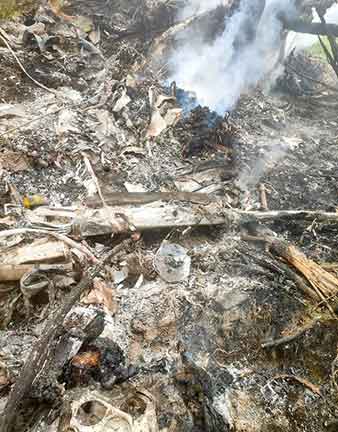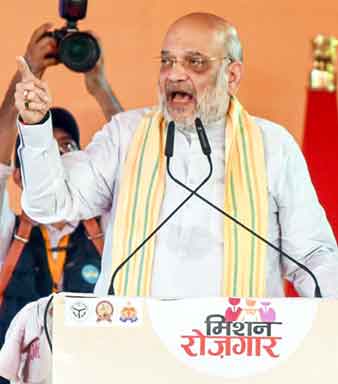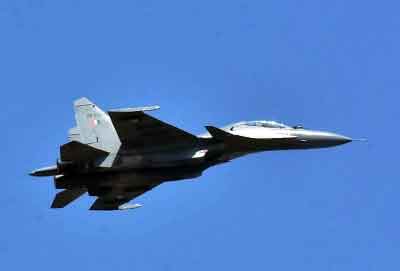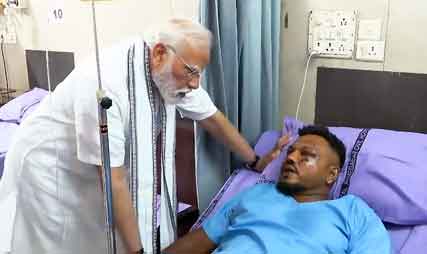India successfully put into orbit the first of its second generation navigation satellite NVS-01 on Monday in a copy book style.
The 2,232 kg NVS-01 satellite -- part of Indian satellite navigation system NavIC or originally called Indian Regional Navigation Satellite System (IRNSS)-- was carried by Geosynchronous Satellite Launch Vehicle (GSLV).
Simply put, NavIC is an Indian 'GPS' - Global Positioning System.
Around 10.42 a.m. the three staged GSLV rocket standing 51.7 metre tall and weighing 420 ton rose up into the skies from the second launch pad here.
Breaking free of the earth's gravitational pull the rocket went up and up with a bright orange fire at its tail.
At the rocket mission control room Indian space scientists at ISRO were glued to their computer screens watching the rocket's flight progress.
Just over 19 minutes into the flight the rocket slung NVS-01 into the Geosynchronous Transfer Orbit (GTO) from where the satellite will be taken up to its final position.
The Indian satellite navigation system NavIC consists of nine satellites -- seven in orbit and two as substitutes. NVS series of satellites will sustain and augment the NavIC with enhanced features.
The NVS-01 with a mission life of 12 years is powered by two solar arrays capable of generating power up to 2.4kW and a lithium-ion battery during the eclipse.
This series has payloads that operate on L1, L5 and S bands thereby widening its services.
The L1 navigation band is popular for providing Position, Navigation and Timing (PNT) services for civilian users and for interoperability with other Global Navigation Satellite System (GNSS) signals, ISRO said.
Be that as it may, ISRO had used imported atomic clocks on all the nine navigation satellites it had launched earlier. Each satellite had three atomic clocks.
It was said the NavIC satellites were performing well until the atomic clocks in IRNSS-1A failed.
Sources in ISRO had earlier told IANS some of the atomic clocks in a couple of other satellites too were not functioning properly. The clocks are used for precise time and location.
Currently there are eight first generation NavIC satellites in orbit.
A senior ISRO official told IANS that out of the eight NavIC satellites in orbit four are functional for navigation services and four others are messaging services.
India has launched nine first generation NavIC satellites including the two standby satellites.
The first standby satellite was lost in the sky as the heatshield of the Polar Satellite Launch Vehicle (PSLV) did not open which necessitated the orbiting of the second standby.
The standby satellites were used as IRNSS-1A satellite launched in July 2013 was not performing to the mark owing to the failure of its imported rubidium atomic clocks.
The atomic clocks are important to give accurate positional data. Each satellite has three atomic clocks.
The outlay for the IRNSS/first generation NavIC systems was said to be about Rs 1,420 crore.
As per a senior ISRO official five more of this version of NVS are planned now. Two more are needed after 2 to 3 years to take care of the end of life of present ones.
According to him, the cost of these five satellites are less than Rs 1,000 crore.
Like the other NavIC satellites, NVS-01 carries two types of payloads -- navigation payload and ranging payload.
The navigation payload will transmit navigation service signals to the users. This payload will be operating in L1, L5 and S-band.
The ranging payload consists of a CxC transponder used for two way CDMA ranging to facilitate precise orbit determination.
"In addition to the L1 band, we have a highly secured code for strategic signals in L5 and S bands," the senior ISRO official remarked.
According to ISRO, NavIC is useful for various civil and strategic applications.
The eight NavIC satellites that are in orbit are: IRNSS-1A, IRNSS-1B, IRNSS-1C, IRNSS-1D, IRNSS-1E, IRNSS-1F, IRNSS-1G and IRNSS-1I.
The NVS-01 launched on Monday will be the ninth one.






Civil Aviation Ministry issues strict instructions to DGCA to enforce chopper safety
In the wake of a tragic helicopter crash in the Gaurikund area of Uttarakhand, the Ministry of Civil Aviation on Sunday issued strict instructions to the Directorate General of Civil Aviation (DGCA) to enforce all safety protocols related to chopper operations in hilly and sensitive areas like the Kedarnath valley.
‘Harming Indians will invite punishment’, HM Shah on Op Sindoor
Union Home Minister Amit Shah said on Sunday that through the anti-terror Operation Sindoor, Prime Minister Narendra Modi has sent a strong message across the world that the bloodshed of Indians will invite punishment.
Dassault CEO trashes Pakistan's claims on downing Rafale jets
Dassault Aviation Chairman and CEO Eric Trappier has dismissed as "factually incorrect" Pakistan’s claims about having shot down three Rafale fighter jets of the Indian Air Force during Operation Sindoor.
Tripura BJP stages protest over vandalism at Tagore's ancestral home in B'desh
Ruling BJP in Tripura on Saturday staged state-wide protests along the Bangladesh border, protesting the recent attack and vandalism of the ancestral home of Nobel laureate Rabindranath Tagore in the neighbouring country.
Two new earthworm species unearthed in Tripura
In a major breakthrough for ecological science in Northeast India, two new species of earthworms—Kanchuria tripuraensis and Kanchuria priyasankari—have been formally identified in Tripura.
CM calls for mass awareness on voluntary blood donation
Chief Minister Prof. Dr. Manik Saha today urged to create massive awareness campaigns about the benefits of voluntary blood donation to encourage more people to donate blood.
Tripura has begun experimental soilless hydroponic farming: Minister
The Tripura government has experimentally started the hydroponics method of cultivation without any soil, the state’s agriculture minister Ratan Lal Nath said here on Friday.
Assam Rifles seized cannabis worth Rs 30 lakh from Tripura
In a swift and decisive operation against narcotics smuggling, Assam Rifles, in close coordination with representatives of the Directorate of Revenue Intelligence (DRI), successfully seized approximately 195 kg of marijuana from the general area of Taranagar, Agartala during the early hours of 12 June.